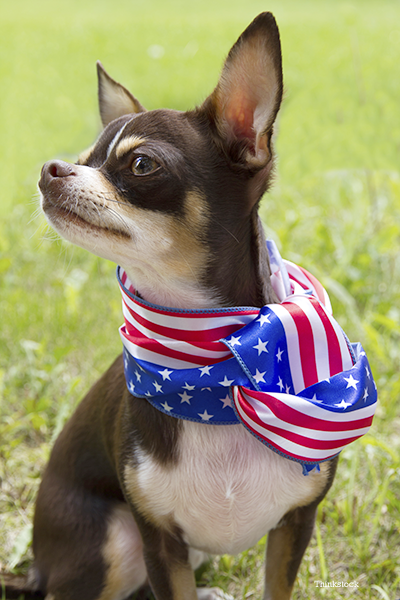
Dr. Justine Lee has some tips for you when it comes to pets and fireworks this 4th of July. For more from Dr. Lee, find her on Facebook!
July 4th marks the anniversary of America's independence. As we celebrate this summer holiday with friends and family, let’s take the time to remember how hazardous this holiday can be to our pets.
Today, we’ll discuss the risks of fireworks, including accidental firework poisoning (when ingested), thermal injuries (from direct contact with a lit firework), and noise phobia or anxiety (from exploding, lit fireworks. Lastly, don’t forget about all those potential food poisonings that can occur during the 4th of July, as we all seem to love to BBQ out on this day!
Thankfully, most pet guardians are aware of the potential dangers of fireworks. That said, accidents happen, and if a pet is left unattended around fireworks, he can become accidentally poisoned or injured. More commonly, pets develop severe anxiety from the noise of fireworks, which can result in undue stress or even the accidental escape out of the house (in an attempt to run away from the sound).Why are fireworks harmful to pets?
Fireworks contain hazardous chemicals such as coloring agents, dangerous heavy metals, sulfur and oxidizing agents such as potassium nitrate. Many of them contain dense cardboard also, which can result in a problem (e.g., foreign body obstruction). If fireworks are accidentally ingested, they can cause gastrointestinal upset in your dog (cats rarely ingest fireworks, thanks to their discriminating palate!).
Clinical signs of firework poisoning include:
- Vomiting
- Drooling
- Painful abdomen
- Bloody diarrhea
- Lack of defecation
- Inappetance/anorexia
- Breathing harder
- Neurologic signs (e.g., tremors, seizures)
- Kidney injury
- Jaundice (yellowing of the skin and mucous membranes)
- Bone marrow changes
Depending on what type of firework your pet ingested – and how many he got into – the clinical signs can vary in severity.Another risk of fireworks? Thermal injury.
If your dog is exposed to lit fireworks, it can cause burns to the face, lips, nose, eyelids/eyes or inside of the mouth. Always keep your pet far out of reach of lit fireworks!
Lastly, the noise factor. Many pets are frightened by the loud, explosive noises that fireworks can make. Pets that are noise-shy (have thunderstorm phobias, startle with loud noises, or are gun-shy, etc.) can be severely affected, and fireworks can bring severe anxiety.
A few tips to conquer the noise factor?
Keep your pet inside while festivities occur. I like to choose the most sound-proof room, farthest from the noise. Keep the room dark and close all windows and doors to minimize the sound.
- Use white noise such as a ceiling fan, air conditioner, radio, TV, etc. to block out the sounds.
- Provide your dog some entertainment (such as a stuffed Kong treat) to distract him from the noise.
- Consider a Thunder shirt to help reduce anxiety.
- And of course, medications. Consider talking to your veterinarian about anti-anxiety drugs or sedatives that can help pets relax during fireworks.
Simply keeping your pets out of the reach of fireworks will prevent them from being poisoned this 4th of July. Keep pets a safe distance away by securing them on a leash or in the house during firework displays. If your pet ingests fireworks this 4th of July, contact your veterinarian immediately for further assistance!
Click here to return to, "Fireworks Safety and the 4th of July."
If you have any questions or concerns, you should always visit or call your veterinarian – they are your best resource to ensure the health and well-being of your pets.
